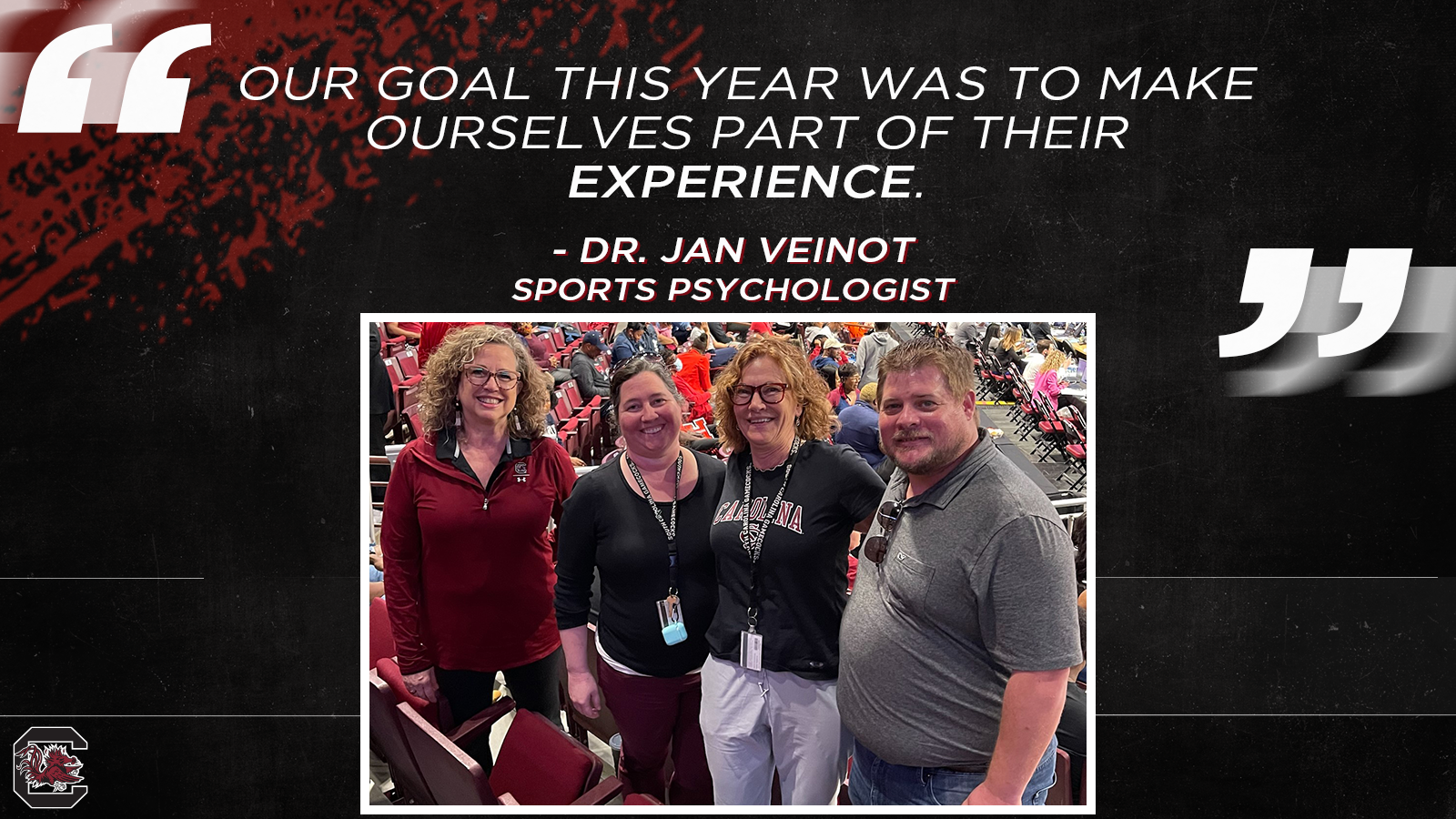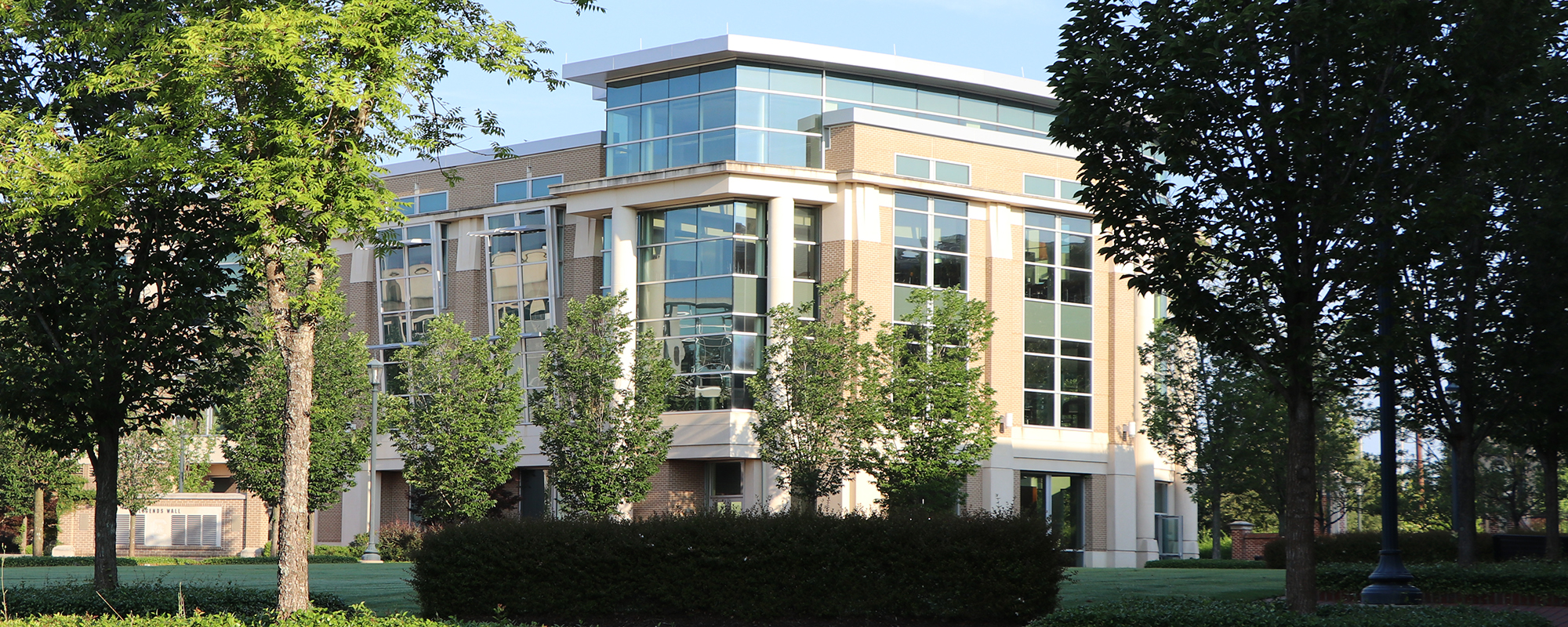
Mental Health Awareness Month - Part 1: Providing Hope to Cope
May is Mental Health Awareness Month, but it's never a bad time to talk about where to get help.
(Pictured above: Dr. Rhea Merck, Sarah Noll, Dr. Jan Veinot, Dr. Mike McCall.)
No matter what you’re going through, you’re not alone.
May is Mental Health Awareness Month, but it’s never a bad time to talk about and remind others where to get help. South Carolina student-athletes have access to a wide range of mental health professionals, and the key is knowing that it’s OK to ask for help, whether it’s for sport performance issues or more personal mental health concerns.
Not so long ago, discussions of suicide were somewhat taboo in the news, but now it’s a reminder that poor mental health can affect anyone for different reasons, even those who seem to “have it all.” In the last couple of months several high-profile student-athletes around the country took their lives. Closer to home, earlier this year, South Carolina track alumna and former Miss USA Chelsie Kryst took her own life as well.
Recent data from the American College Health Association National College Health Assessment shows that 65% of college students feel hopeless.
“Feeling hopeless is one of the number one risk factors for suicide,” said Dr. Rhea Merck, a licensed psychologist, who is a member of the staff that works with the Gamecock student-athletes. “So, we have an epidemic going on. It’s not just in college sports, but the sports bring it up into the light where people immediately hear about it.”
According to the American Foundation for Suicide Prevention, suicide is the third leading cause of death for individuals in South Carolina ranging between the ages of 10-24.
In many of these cases, friends and family say they didn’t see any “red flags” that would have prompted concern.
So why is this happening? What are the most common issues among those who consider suicide? What are the warning signs to look for? Where can South Carolina student-athletes get help for themselves or their teammates?
“The goal of it is create an atmosphere where it’s OK to talk, and it’s OK to utilize the resources.”
– Dr. Mike McCall
WHAT WE HAVE
South Carolina Athletics provides its student-athletes access to a wide variety of mental health providers, with expertise ranging from mental performance to mental health services, covering their psychological, psychiatric, and emotional needs. Students can also be referred to other professionals if needed. The key in all of this is recognizing when someone needs help and getting them to seek or want to be helped.
“People who come to see us aren’t the people you really have to necessarily worry about because they’re the ones seeking help,” said sports psychologist Dr. Jan Veinot, who is also part of the team that serves the Gamecocks. “We see them, and we check in them. In mental health education, it’s really critical to identify them.”
South Carolina Athletics has six mental health professionals on staff with psychiatrist and Director of Mental Health Dr. Timothy Malone, Director of Operations for Mental Performance Sarah Noll, licensed psychologists Dr. Rhea Merck and Dr. Mike McCall, sports psychologist Dr. Jan Veinot, and Director of Sport Leadership and Mental Performance, Dr. Raylene Ross.
“We do primarily individual counseling, and we do group sessions as well, which is usually with the teams wanting to improve performance and/or culture,” said Noll. “If there is a crisis, and someone is expressing suicidal thoughts, we are often the first point of contact.”
The Gamecocks are notified of these mental health resources at team meetings prior to the start of each year, and new students are also introduced to them as part of new student-athlete orientation. Senior women’s soccer standout Samantha Chang came to South Carolina from Canada and suffered a torn ACL at the outset of her collegiate career. Being that far from home and then temporarily losing her ability to compete was a lot to handle all at once, and she sought out the available resources.
“That freshman fall was pretty hard for me, mentally and emotionally,” said Chang, who also advocates for the use of sport performance counseling. “I was a long way away from everybody that I knew, and I wasn’t able to play soccer. So, it upset my life in a lot of ways. That’s when I started using the resources. It was more about psychological and emotional therapy. My experience was really good. It was nice to talk with someone who was nonjudgmental about what was going on and someone who was solely there to help you get through it.”
“To circle back to the question about how you find the ones that aren’t coming in, we’re going to practice and competitions,” Dr. Veinot said. “We’re checking in because you can pick up on non-verbal cues with the way someone’s acting on the bench or in a performance. It also helps because they see us, and our goal this year was to make ourselves part of their experience. They have an academic advisor. They have a coach. They have a sports performance person.”
“Showing up more often to practices and just being around more helps to be present and have those sidebar conversations,” Noll said. “That’s not therapy. It’s relationship-building. It’s a reminder that we’re here and we’re available. The athletic trainers are our gateways in a lot of cases.”

Dr. Raylene Ross
“Another major issue that is part of this dynamic is the support of parents and family,” Dr. Ross said.
Teammates or staff who notice an issue can also fill out a referral on the Teamworks app if they see some concerning behaviors, and one of the mental health professionals can reach out to the particular student-athlete.
“If the referral is not coming from the student-athlete, they may not be as motivated to continue or even start therapy,” Noll said. “That can be a challenge, but we reach out and we remind them that we’re here.”
“The goal of it is create an atmosphere where it’s OK to talk, and it’s OK to utilize the resources,” Dr. McCall said. “The student-athletes who attend and have success with us, they tell others. Word of mouth spreads it, too. It’s not only about being visibly present, but when others have come to us and had good experiences, it helps their teammates feel more comfortable utilizing our services as well.”
Check out part two of this series to be posted on May 18 to find out some warning signs you should be aware of for individuals who may be suffering from depression or having suicidal thoughts.
More in this series:
Mental Health Awareness Month: Standing Up for Opening Up
Mental Health Awareness Month: Part 2 – Warning Signs












